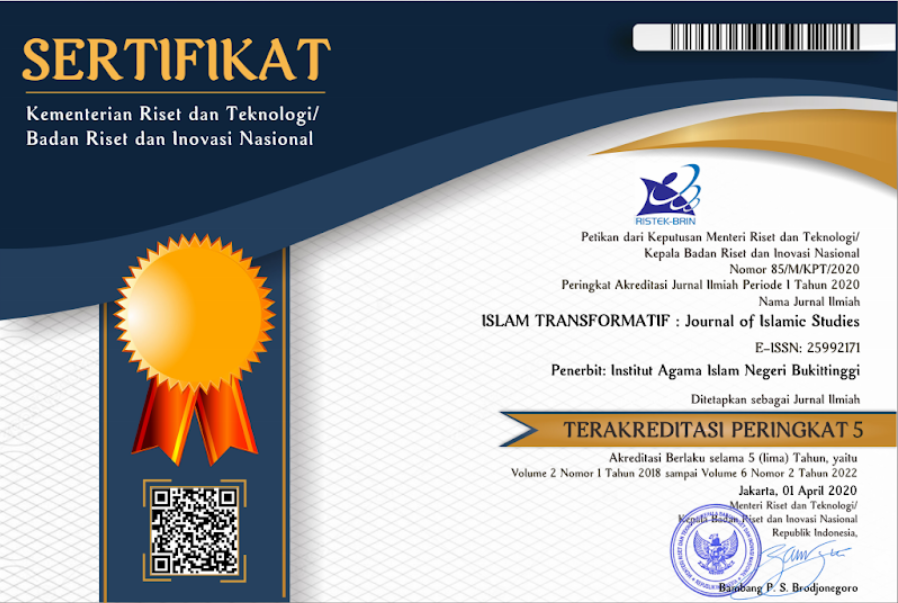PENGARUH KEPEMIMPINAN TRANSFORMASIONAL KEPALA SEKOLAH DAN PROFESIONALISME GURU TERHADAP IMPLEMENTASI MBS PADA PESANTREN DI KABUPATEN AGAM
DOI:
https://doi.org/10.30983/it.v2i1.437Keywords:
Transformational Leadership, Teacher Professionalism, School Based ManagementAbstract
Leadership of madrasah headmasters and teacher professionalism are the two things that determine the successful of implementation of school-based management. This study aims at knowing the effect of headmaster transformational leadership and professionalism of teachers either individually or collectively toward the successful of the implementation of School Based Management in pesantren in Agam District. This research is done by using quantitative approach. The population of this study is all teachers of Pesantren Agam Regency, 896 people. The samples were selected by Area sampling technique and Simple random sampling, as many as 227 teachers. Data analysis using correlation and regression techniques with the help of SPSS program. The results showed that the transformational leadership of madrasah headmasters and professionalism of teachers both individually and collectively have the affect toward the implementation of School Based Management in pesantren in Kabupaten Agam. Kepemimpinan kepala madrasah dan profesionalisme guru merupakan dua hal yang menentukan keberhasilan pelaksanaan manajemen berbasis sekolah. Penelitian ini bertujuan untuk mengetahui pengaruh kepemimpinan transformasional kepala madrasah dan profesionalisme guru baik secara sendiri-sendiri maupun secara bersama terhadap keberhasilan pelaksanaan Manajemen Berbasis Sekolah pada pesantren di Kabupaten Agam. Penelitian ini dilakukan dengan menggunakan pendekatan kuantitatif. Populasi penelitian ini adalah seluruh guru pesantren Kabupaten Agam berjumlah 896 orang. Sampel dipilih dengan teknik Area sampling dan Simple random sampling, sebanyak 227 orang guru. Analisis data menggunakan teknik korelasi dan regresi dengan bantuan program SPSS. Hasil Penelitian menunjukkan bahwa kepemimpinan transformasional kepala madrasah dan profesionalisme guru baik secara sendiri-sendiri maupun secara bersama berpengaruh terhadap pelaksanaan Manajemen Berbasis Sekolah pada pesantren di Kabupaten Agam.References
Afriansyah, “Manajemen Berbasis Sekolahâ€, Artikel, Fisip Administrasi Negara, Universitas Diponegoro, 2005
Amiruddin, S.,Khairuddin, dan Irwan,N. (2006). Manajemen Pendidikan Berbasis Sekolah. Ciputat: Quantum Teaching.
Borko, H., Wolf,S., Simone, G., & Uchiyama, K. (2003). “Schools in Transition:
Daryanto.2001. Administrasi Pendidikan. Jakarta: Rineka Cipta.h. 81
Gay, L.R. dan Airasian,P. (2000). Educational Research. (6 th, ed), New Jersey : Prentice-Hill. Inc.
Hadiyanto.(2004). Mencari Sosok Desentralisasi Manajemen Pendidikan di Indonesia: Pengantar oleh H.A.R. Tilaar. Jakarta: Rineka Cipta.
IMasrukhin. 2009. Faktor-Faktor Penentu Keberhasilan Pelaksanaan Manajemen Berbasis Sekolah (MBS) Di Sekolah Menengah Atas (SMA) Se-Wilayah Eks Karesidenan Pati. Disertasi. Program Studi Manajemen Pendidikan, Program Pascasarjana, Universitas Negeri Semarang.
Mulyasa.(2004). Manajemen Berbasis Sekolah : Konsep, Strategi, dan Implikasi. Bandung: Remaja RosdaKarya.
Mulyasa. E. (2003). Manajemen Berbasis Sekolah , Jakarta:Rosda
Nurkolis. (2003). Manajemen Berbasis Sekolah . Jakarta: PT. Gramedia Widiasarana Indonesia
Sagala. Syaiful, (2005). Manajemen Berbasis Sekolah dan Masyarakat: Strategi memenangkan persaingan mutu. Malang: Nimas Multima.
Suparno Paul, dkk, 2002, Reformasi Pendidikan Sebuah Rekomendasi, Yokyakarta: Kanisius.
The word Bank. (1998). Education in Indonesia : From Crisis to Recovery. World Bank: Education Sector Unit East Asia and Pasific regional Office.
Downloads
Submitted
Accepted
Published
Issue
Section
License
Authors who publish with this journal agree to the following terms:
- Authors retain copyright and grant the journal right of first publication with the work simultaneously licensed under a Creative Commons Attribution-ShareAlike 4.0 International License that allows others to share the work with an acknowledgment of the work's authorship and initial publication in this journal.
- Authors are able to enter into separate, additional contractual arrangements for the non-exclusive distribution of the journal's published version of the work (e.g., post it to an institutional repository or publish it in a book), with an acknowledgment of its initial publication in this journal.
- Authors are permitted and encouraged to post their work online (e.g., in institutional repositories or on their website) prior to and during the submission process, as it can lead to productive exchanges, as well as earlier and greater citation of published work (See The Effect of Open Access).













